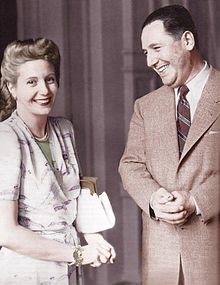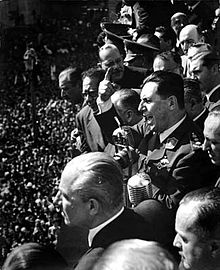Peronism
Peronism[a] or justicialism[b] is an Argentine political movement based on the ideas and legacy of Argentine president Juan Perón (1895–1974).[1] It has been an influential movement in Argentine politics.[1] Since 1946 Peronists have won 10 out of the 13 presidential elections in which they have been allowed to run.[2] The main Peronist party is the Justicialist Party.[2] The ideas of each president were different,[2] but the general ideology has been described as "a vague blend of nationalism and labourism"[2] or populism.[1]



Juan Perón became Argentina's minister of labour after participating in the 1943 military coup and was elected president of Argentina in 1946.[1][3] He introduced social programs that benefited the working class,[4] supported labor unions, and called for additional involvement of the state in the economy.[1] In addition he helped industrialists.[2] Perón was very popular and gained even more admiration through his wife, Eva, who championed for the rights of migrant workers and was loved by the people.[5] Due to rising inflation and other economic problems, the military overthrew Perón in 1955.[6] The Peronist party was banned[6] and it wasn't until 1973 that open elections were held again. In the 1973 election, Perón was again elected president.[1] He died the next year and his widow, Isabel, took his place as president.[1] Similar social reforms to those introduced during Peron's first presidency were carried out by the Peronists upon returning to power in 1973.[7] However, Perón's death had led to disunity and the military overthrew Isabel in 1976.[1]
Peronist Carlos Menem was president from 1989 to 1999. His policies were very different from previous Peronists.[2] He focused on privatization,[2] free-market policies,[1] and international relations.[2] Peronist Néstor Kirchner was president from 2003 to 2007, and his wife Cristina Fernández de Kirchner was president from 2007 to 2015.[1] According to the Economist, the Kirchners returned to "economic nationalism and near-autarky".[2] The ideology of the Kirchners is known as Kirchnerism.
Related pages
changeReferences
change- ↑ Spanish: peronismo
- ↑ Spanish: justicialismo. The Justicialist Party is the main Peronist party in Argentina, it derives its name from the concept of social justice.
- ↑ 1.00 1.01 1.02 1.03 1.04 1.05 1.06 1.07 1.08 1.09 "Peronist". Encyclopedia Britannica. Retrieved 9 November 2019.
- ↑ 2.0 2.1 2.2 2.3 2.4 2.5 2.6 2.7 2.8 "The persistence of Peronism". The Economist. 15 October 2015. Archived from the original on 2019-07-18.
- ↑ Dougherty, Terri (2003). Argentina. p. 35. ISBN 978-1-59018-108-9 – via Internet Archive.
- ↑ Dougherty 2003, p. 36.
- ↑ Dougherty 2003, p. 37.
- ↑ 6.0 6.1 Dougherty 2003, p. 39.
- ↑ Power, Alliances, and Redistribution The Politics of Social Protection for Low-Income Earners in Argentina, 1943–2015 By Carl Friedrich Bossert, 2021, P.154-156